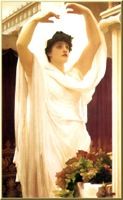Difference between revisions of "Invocation"
m (Text replacement - "http://nordan.daynal.org" to "https://nordan.daynal.org") |
|||
| Line 2: | Line 2: | ||
==Origin== | ==Origin== | ||
| − | [ | + | [https://nordan.daynal.org/wiki/index.php?title=English#ca._1100-1500_.09THE_MIDDLE_ENGLISH_PERIOD Middle English] ''invocacioun'', from Middle French & Latin; Middle French ''invocation'', from [[Latin]] ''invocation''-, ''invocatio'', from ''invocare'' |
*[http://en.wikipedia.org/wiki/14th_century 14th Century] | *[http://en.wikipedia.org/wiki/14th_century 14th Century] | ||
==Definitions== | ==Definitions== | ||
Revision as of 22:27, 12 December 2020
Origin
Middle English invocacioun, from Middle French & Latin; Middle French invocation, from Latin invocation-, invocatio, from invocare
Definitions
- 1a : the act or process of petitioning for help or support; specifically often capitalized : a prayer of entreaty (as at the beginning of a service of worship)
- b : a calling upon for authority or justification
- 2: a formula for conjuring : incantation
- 3: an act of legal or moral implementation : enforcement
Description
As a supplication or prayer, invocation implies to call upon God, a god or goddess, a person, etc. When a person calls upon God, a god, or goddess to ask for something (protection, a favour, his/her spiritual presence in a ceremony, etc.) or simply for worship, this can be done in a pre-established form or with the invoker's own words or actions. An example of a pre-established text for an invocation is the Lord's Prayer.
All religions in general use invoking prayers, liturgies, or hymns; see for example the mantras in Hinduism and Buddhism, the Egyptian Coming Out by Day (aka Book of the Dead), the Orphic Hymns and the many texts, still preserved, written in cuneiform characters on clay tablets, addressed to Shamash, Ishtar, and other deities.[1]
